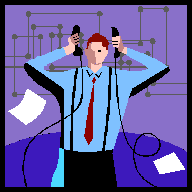
Organizing & Productivity Consultant
Certified Business & Personal Coach
October 2003
Issue 44

“What does it matter how much
we do
if what we’re doing isn’t what matters most?”
--Stephen Covey
Joe Robinson, author of Work to Live: The Guide to Getting a Life, tells us that corporate downsizing has left the U.S. with the stingiest vacation leave allotment in the industrialized world. According to the Bureau of Labor Statistics, the average American gets 8.1 days vacation after one year on the job, and only 10.2 days vacation after three years on the job.
The result is something that Robinson calls “vacation-deficit disorder,” which he defines as unrelieved stress, burnout, absenteeism, rising medical costs, diminished productivity and the loss of time for life and family.
A survey conducted by online travel agency Expedia.com, found that Americans will be taking 10% less vacation time this year than last. The respondents report that there is simply too much work to be done to get away. According to the Society for Human Resource Management, 13% of American companies provide no paid leave for their employees – up from only 5% five years ago. In the state of Washington -- where I live -- a whopping 17% of employees get no paid leave.
According to a National Institute of Management report, performance declines 25% after a 60-hour workweek. Americans are now logging more work hours than we have since the 1920s. Nearly 40% of Americans work more than 50 hours a week. I suspect that this will only get worse. A couple months ago, before members of the House of Representatives left for their month-long vacations, they approved the White House’s rewrite of wage and hour regulations … which means that anyone employed in a “position of responsibility” can be turned into a salaried employee. Salaried employees are exempt from being entitled to the existing 40-hour-per-week maximum number of hours worked without overtime pay. Salaried employees can be required to work unlimited overtime for no extra pay. According to the May 12 Newsweek article "Overworked, Underpaid?," the Bush administration claims that 644,000 workers will lose overtime eligibility, but the Economic Policy Institute's estimate is that 2.5 million and possibly up to 8 million workers who will lose their overtime pay.
According to Robinson, “Vacations are being downsized by the same forces that brought us soaring work weeks: labor cutbacks, a sense of false urgency created by tech tools, fear, and most of all, guilt. The message, overt or implied, is that it would be a burden on the company to take all your vacation days – or any.” Employees are getting the hint. According to the Expedia.com survey, one out of five employees say they feel guilty taking their vacation. Even though employees are entitled to paid leave in some companies, it is often difficult to arrange vacation when the employee wants time off. Many employees are told that their company is just “too busy” to let them go. Case in point: a nurse in Southern California, who last year put in her vacation request in January for her son’s wedding in July. She was told that they didn’t know if she could have the time off, because they expected to be busy then. Days before the wedding, she was finally granted time off when she cornered the director of the company to plead her case.
The United States is now the only industrialized nation with no minimum paid leave law. Europeans get 4-5 weeks paid vacation required by law and sometimes get an additional week or two of paid vacation offered by employers. The Japanese have two legally-mandated weeks of paid vacation. China has three weeks of mandated paid vacation. In America, with no statutory protection, paid vacation is solely at the discretion of employers.
“Evidence shows that time off is not the enemy of productivity; to the contrary, it’s the engine,” according to Robinson. “Contrary to the American myth, a number of European countries have caught up with the United States in productivity.” In fact, Europe had a higher productivity growth rate in 14 of the 19 years between 1981 and 2000, according to the U.S. Federal Reserve Board.
Being overworked does not just cost the employees. One study reported that the tab paid by business for job stress is $150 billion a year.
Whether we are employers, employees, or self-employed, this is an important issue that is not going away. For the health of our nation, we need a law that requires a minimum amount of paid leave to be available to everyone, regardless of how many years someone has been with a company. We could learn a lesson or two from our European friends about how to increase productivity.Although I have been describing corporate America, I’ve found that solo entrepreneurs can just as easily get swept up into this idea of working harder. A number of them are my clients. They come to me when the stress is more than they can take, and they are ready to learn how to work smarter, not harder.
Today’s work environment presents steep challenges for those wanting to save time and money, reduce stress, and manage the ever-increasing information flow. For those who need to do more work with less support, here are some tips to help you be more productive:
- Plan and
organize your week so you are focused on your priorities – both professional
AND personal ones.
Do you find yourself putting things off that are important to you because
you have so many urgent tasks that need your attention? Do you look
back at the end of the day with regret and wish that you had spent your
time focusing on more important things ... such as time with your family,
time for self-care, or time to work on an important project that has
no deadline? Carve out time to focus on what’s most important.
- Set up
your work environment to keep your focus on
what’s most important. October 5-11 is National Get Organized Week
– a great time to start implementing some new ideas to get and keep
you organized. Here are 5 tips:
- Create
a filing system which will enable you to find things quickly, no matter
where you filed it. The number one reason people pile instead
of file is a fear of never finding it again. You're invited
to participate in my FREE upcoming Find
Anything in 5 Seconds teleclass and I’ll show you how you can
file your papers so you’ll find them in 5 seconds or less. I’ll also
tell you about a powerful software tool that will help you find any
electronic document on your hard drive or server in 5 seconds or less.
The month of October is Clean Out Your Files Month.
- Create
a tickler file system to remind you of important follow up at the
appropriate time. The #2 reason that
people pile is a fear of forgetting to do something that is out-of-sight,
out-of-mind. A good tickler system reminds you to follow up on the
appropriate date, and provides an alternative to that “I’ll just set
it here for now” pile. Participate
in my FREE upcoming Buried
in Paper teleclass to learn how to create an effective tickler
system.
- Trim
the F.A.T. – File, Act, Toss. When
processing incoming mail or email, decide immediately if it is to
be (1) filed for future reference, (2) acted upon, or
(3) tossed. If it requires action and you choose not
to act on it now, place it in your tickler file for when you
will take the next action required. Click here to learn
more about this process, or participate in my FREE upcoming Buried
in Paper teleclass.
- Keep
only what you plan to focus on today on your desktop.
Remove visual distractions from your workspace so your attention is
not pulled away from what you’ve chosen to work on today! Everything
else can be stored elsewhere until it’s time for you to focus on it.
- Schedule 10-15 minutes at the end of each workday to organize your work space and review your plans for tomorrow. Psychologists have found that we enjoy our non-work hours much more when we leave the office with an organized desk and a plan for the following day. This is also a good time to check your tickler file for the next day so you can begin mentally preparing for what needs your attention tomorrow.
- Schedule weekly “admin”
time to tend to routine activities that you know need to be done regularly –
filing, checking email, returning phone calls, etc. Although these activities
are important, they are generally not urgent…but if they get neglected long enough
they will become urgent when you cannot find something you need or a deadline gets
overlooked.
- Say NO to activities that
are not important to you. If you need a reminder
of what to say YES to, consider using a daily checklist and
a PageUp Copy Holder (included in the Complete Tickler Filing System) that
can hold your checklist upright so it does not get buried on your desk.
- Plan a vacation at least once a year. If you cannot afford to travel, take the time off from work and identify free or inexpensive things you can do locally to help you rest and relax.
If you work for a company that does not support paid vacation leave, consider looking for another place to work – one that cares enough about you to support your decision to take care of yourself. If you are your own boss, be kind to your most valuable employee – you – and take a vacation when you need it.
|
Hear Kathy interviewed live on KKNW Radio
Click here to listen to a recording of Kathy’s live radio interviews
OR
Tune in 1150 on your AM dial in the Seattle area on the following dates:
October
16 from Noon-12:30 PM Pacific time
November 19 from Noon-12:30 PM Pacific time
Buried
in Paper? What are your piles of paper costing you? Peace of mind? Missed opportunities? Late payment fees? Time to do what you care about most? This teleclass will teach you how to handle mail and other paper as it comes into your home or office. You’ll learn a system that will remind you of important follow-up. Click here for more information on this FREE teleclass. œť Find
Anything in 5 Seconds You'll receive a free trial download of The Paper Tiger and get a hands-on "tour" through the inner workings of this remarkable software (no scanning required). Here's your opportunity to decide if this is the right system for your needs -- try before you buy! Click here for more information on this FREE teleclass. œť Taming
Your Paper Tiger Click here for more information on this teleclass. œť De-clutter
Your Life:
Click here for more information on this teleclass.
|
I help individuals committed to moving their lives forward in powerful ways
by decluttering their schedules, spaces, and minds.
Table of Contents for Past Issues
Company Store
|
Paauwer Tools is a free monthly newsletter. To subscribe to this newsletter click here. We appreciate your forwarding this to your friends and colleagues you think might benefit from reading it. Your recommendation is how we grow. Anyone can subscribe. We request that you keep the broadcast intact, including the contact and copyright information. You are
free to use the material from my articles in whole or in part
on your web site or ezine (email newsletter) as long as you
include the attribution below and also let me know where the
article will appear.
E-mail your comments, questions, and suggestions for future newsletter content to me. I'd love to hear your thoughts! Warm regards, Kathy Paauw, Paauwerfully Organized |

